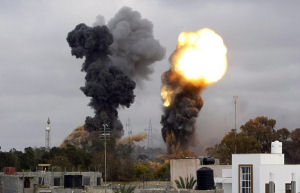
Which Entity is the Government of Libya and Why does it Matter?
In the past couple of days, Germany and Canada have joined the group of countries that have declared that they consider the National Transitional Council (NTC) in to be the “legitimate representative” of the Libyan people. But what exactly does this mean? According to the BBC, the group of countries extending this recognition includes France, the UK, Italy, Spain, Germany, the UAE, Qatar, Jordan, Gambia, Senegal and Australia. Russia and the United States have had meetings with the NTC and have also made similar declarations about the illegitimacy of the Gaddafi regime and about the legitimacy of the NTC (see previous post by Stefan Talmon on the US position in March). What are the legal implications, if any, of these …
Justice and Gadhafi’s Fight to the Death
Everyone wants to see wrongdoers punished. But safe exile for bad rulers is often the least worst option. The violence in the Ivory Coast that has left more than 1,300 dead since last November’s presidential election may soon be coming to an end. Incumbent President Laurent Gbagbo, who refused to cede power after losing in the polls to Alassane Ouattara, is reportedly negotiating the terms of his surrender after a week-long offensive by pro-Ouattara forces. What’s puzzling about how this conflict is ending is why Gbagbo didn’t leave sooner, especially after African Union leaders had offered him immunity several times if he agreed to go into exile in South Africa. With 80% of Ivorian territory taken by pro-Ouattara forces and …
What does UN Security Council Resolution 1973 permit?
I spent much of yesterday conducting interviews with the media about the situation in Libya. One of the questions I was repeatedly asked concerned the scope of the UN Security Council Resolution 1973 which authorises the use of force in Libya. How far does the resolution permit the coalition now acting in Libya to go? What are the objectives of the coalition military action? Does it permit the targeting of Colonel Gaddafi? The objectives set out by the resolution seem to me to broader than what is commonly thought. Para. 4 which authorises the use of all necessary means (short of an occupation force) is not just about protecting civilians but also, importantly, about protecting civilian populated areas under threat of attack. In other words, that paragraph authorises the use of …









